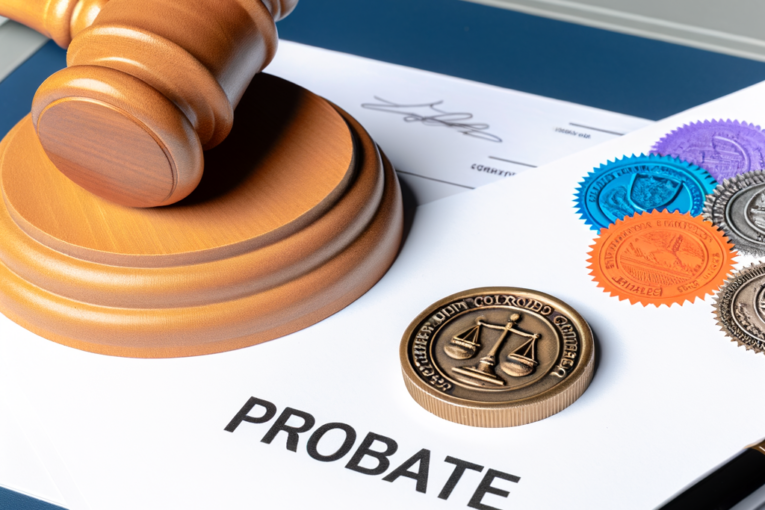Are you struggling with the complexities of writing a will? Don’t worry; you’re not alone. Many individuals find this crucial task overwhelming and often end up putting it off indefinitely. But fear not! This blog post is here to guide you through the process, step-by-step, making it simple and easy to understand.
We’ll break down the necessary components involved in creating a valid will, so you don’t have to feel lost or confused anymore. From selecting beneficiaries and choosing an executor and guardian (if you have children) to ensuring the proper signing and safe storage of the document, we’ve got you covered!
The goal is to empower you with essential knowledge, enabling you to make informed decisions regarding your personal estate. So, don’t delay any longer; let’s embark on this journey together and ensure your loved ones are well taken care of in the future.
Key Takeaways
- Signing your will with your intended signature ensures its legality and reduces potential disputes.
- Choose a secure storage method for your will, such as a legal professional, notary public, or filing with the probate court.
- Regularly review and update your will, especially after major life events, to ensure it reflects your current intentions.
- Consider adding other estate planning documents, such as living wills and powers of attorney, for a comprehensive estate plan.
11 Steps to Writing a Will
Embarking on the task of writing a will necessitates a methodical approach, which encompasses securing an estate planning attorney or utilizing a do-it-yourself software program.
This simple guide to the steps in writing a will begins with designating beneficiaries and electing an executor, crucial components within this legal document that can steer the probate process.
If applicable, the selection of a guardian for minor children is essential. Specificity and realism should dictate asset allocation decisions.
Appending a letter with elaborate instructions may be beneficial.
The completed document must be signed correctly and stored safely to validate online wills or traditional paper versions.
Regular review and timely updates ensure its continued relevance, completing the cycle of responsible estate planning.
1. Find an Estate Planning Attorney or Use a Do-it-Yourself Software Program.
Navigating the intricacies of estate planning necessitates either asking for the aid of a seasoned estate planning attorney or employing a reputable do-it-yourself software program. These options mitigate potential risks associated with improperly prepared documents, ensuring adherence to all legal requirements while writing a will.
| Estate Planning Attorney | Do-It-Yourself Software Program | |
| Costs | Usually higher, but covers in-depth consultation and personalized legal advice. | A more affordable option, but lacks personal guidance. |
| Risks | Mistakes are less likely due to professional oversight. | Errors may occur without professional scrutiny. |
| Reputation | Generally reliable if chosen carefully. | It depends on the software’s credibility and the user’s |
This simple guide emphasizes that choosing between an estate planning attorney and online services should be based on one’s specific needs and financial capacity. Both options provide ways to create legally sound estate planning documents, aiding individuals in their pursuit of comprehensive will preparation.
2. Select Beneficiaries
Selecting beneficiaries is a pivotal step in the process of estate planning. It involves careful consideration and specificity to ensure one’s assets and property are distributed according to their wishes.
This requires detailed beneficiary designations. Primary beneficiaries are first in line to inherit assets or property. Secondary beneficiaries should be named as backups in case the primary ones die. An alternate beneficiary can be named if both primary and secondary beneficiaries cannot inherit.
A residuary beneficiary is also crucial for comprehensive estate planning. They receive any leftover assets not specifically assigned in the will.
These steps underscore the importance of specific allocations in wills and estate planning. They help avoid possible complications or misunderstandings after one’s demise.
3. Choose Your Executor
Determining the executor of your will is a key decision in estate planning. This individual shoulders the responsibility of ensuring that your instructions are carried out accurately, assets are distributed appropriately, and the probate process is managed effectively.
As part of a simple guide to writing a will, choosing an executor involves assessing their reliability and understanding of legal processes. Probity and financial acumen are crucial factors to be considered when making this selection. An ideal candidate should possess the testamentary capacity and efficiently play the role of personal representative.
This estate planning tool facilitates a smooth transition posthumously by preserving the decedent’s wealth according to their wishes while mitigating potential disputes or misunderstandings amongst beneficiaries.
Choose a Guardian for Your Children
Establishing a guardian for minor children forms an essential component of estate planning, encapsulating the assignment of legal authority and responsibility to a trusted individual who would care for your children in unforeseen circumstances.
This designated person, known as a legal guardian, assumes both the physical and financial well-being of your child or dependent child. The selection process necessitates careful consideration; family dynamics, values, and stability should all be factored in when evaluating potential guardians.
5. Be Specific About Who Gets What
Precision in allocating assets to beneficiaries is important in estate planning, as it paves the way for an unambiguous distribution of wealth and minimizes potential family conflicts or strained relationships.
- Engaging an estate lawyer can facilitate a comprehensive understanding of wills and the legal implications related to the distribution of assets.
- Understanding family dynamics is crucial; decisions should be made transparently, considering the needs, abilities, and circumstances of each beneficiary.
- A power of attorney may be necessary to ensure that decisions are carried out according to your wishes.
- Being specific about who gets what not only prevents ambiguity but also discourages disputes among beneficiaries.
This meticulous approach promotes fair allocation while preserving familial harmony during such sensitive times.
6. Be Realistic About Who Gets What
Having established the necessity of specificity in asset allocation, it is equally crucial to approach this task with a sense of realism. Realistic distribution involves a careful evaluation of your person, estate, property, and money, taking into account the unique circumstances that define your family situation.
Owing to the complexities involved in distributing tangible assets among children, using boilerplate language often leads to unintended consequences. It overlooks individual needs and circumstances, such as one child’s requirement for educational funds with shorter investment horizons or a grandchild’s potential long-term investment horizon.
Therefore, various types of wills, including testamentary trusts, should be considered for their ability to cater to these distinct needs while ensuring proper allocation according to actual needs rather than an abstract notion of equality.
7. Attach a Letter to Your Will
Incorporating an explanatory letter into your will is a significant step that allows you to leave behind a personal goodbye and provide additional explanation for specific bequests. This process, as part of a simple guide to writing a will, should occur after completing steps one through four, which include identifying all property to distribute.
The form of the letter may vary depending on individual preference, but it should
Clearly express your final words or sentiments.
Offer clarification for certain decisions made in your will.
A step-by-step reminder: this document does not replace legal requirements but complements them. It must be properly attached to the will, typically witnessed by two disinterested witnesses, to maintain its credibility and validity.
8. Sign Your Will Properly
Ensuring that you sign your will correctly is of paramount importance, as it solidifies the validity and legally binding nature of this crucial document.
The act of signing represents a conscious commitment to the provisions outlined within, thus necessitating utmost precision during execution.
This step requires the presence of two witnesses who are at least 18 years old and not named in the will, adding an additional layer of security to the process. Meeting these requirements is non-negotiable for a valid will concerning personal property or real estate.
Moreover, signing with your intended signature while in a sound mind ensures its legality under specific state laws. This option significantly reduces ambiguity and potential future disputes over the testator’s intentions or mental capacity at signing time.
9. Store Your Will Safely
Once the signing process is concluded, attention shifts to finding a secure storage method for your will to ensure its safekeeping and accessibility when required. A simple guide to writing a will suggests various options, such as contracting a legal professional or notary public who can safely store it or filing it with the probate court. However, informing family members about this arrangement is vital.
Alternatively, storing in a safe deposit box ensures protection, but state laws may complicate access upon death. Leaving it with an executor requires absolute trust and necessitates a contingency plan if they are unavailable. Lastly, online storage services offer convenience but require robust security measures.
Regardless of your choice, each option necessitates careful consideration and proper arrangements to store your will safely.
10. Review and Update Your Will
Proactive revision and modification of your testamentary document is critical, particularly following major life events such as marriage, divorce, the birth of a child, or receiving an inheritance. These occurrences can drastically alter the distribution scheme outlined in a pre-existing will. Therefore, it’s essential to review and update your will in these circumstances to ensure that your estate is distributed according to your current intentions.
Moreover, if any beneficiaries or the chosen executor pass away before you do, immediate amendments are necessary.
The simple guide to writing a will suggests consulting with an estate attorney who has access to resources for estate planning, including up-to-date rules for wills and attorney-built forms. This ensures your testament form reflects accurate legal requirements and personal wishes.
11. Add Other Estate Planning Documents
In the intricate realm of estate planning, it is crucial to consider additional documents such as living wills and powers of attorney that complement a comprehensive estate plan. These basic estate planning documents grant legal authority to designated individuals and dictate preferences for potential healthcare or financial decisions.
A durable power of attorney, for instance, empowers another individual to manage one’s financial affairs in case of incapacity.
Similarly, living trusts can provide an effective way to manage assets during life and simplify asset distribution after death.
Moreover, a testamentary trust established within the will can offer further control over how assets are distributed upon death.
The county clerk or an equivalent legal entity must notarize these documents in order for them to be legally binding.
Conclusion
In conclusion, the creation of a will is an integral part of estate planning. It ensures the proper distribution of assets according to one’s wishes and provides security for dependents.
Regular review and updates, secure storage, correct signing, and careful selection of executors and guardians ensure its effectiveness.
Additionally, incorporating other necessary legal documents complements this planning process.
The guidance of an estate planning attorney or a reliable software program can facilitate this essential task.





